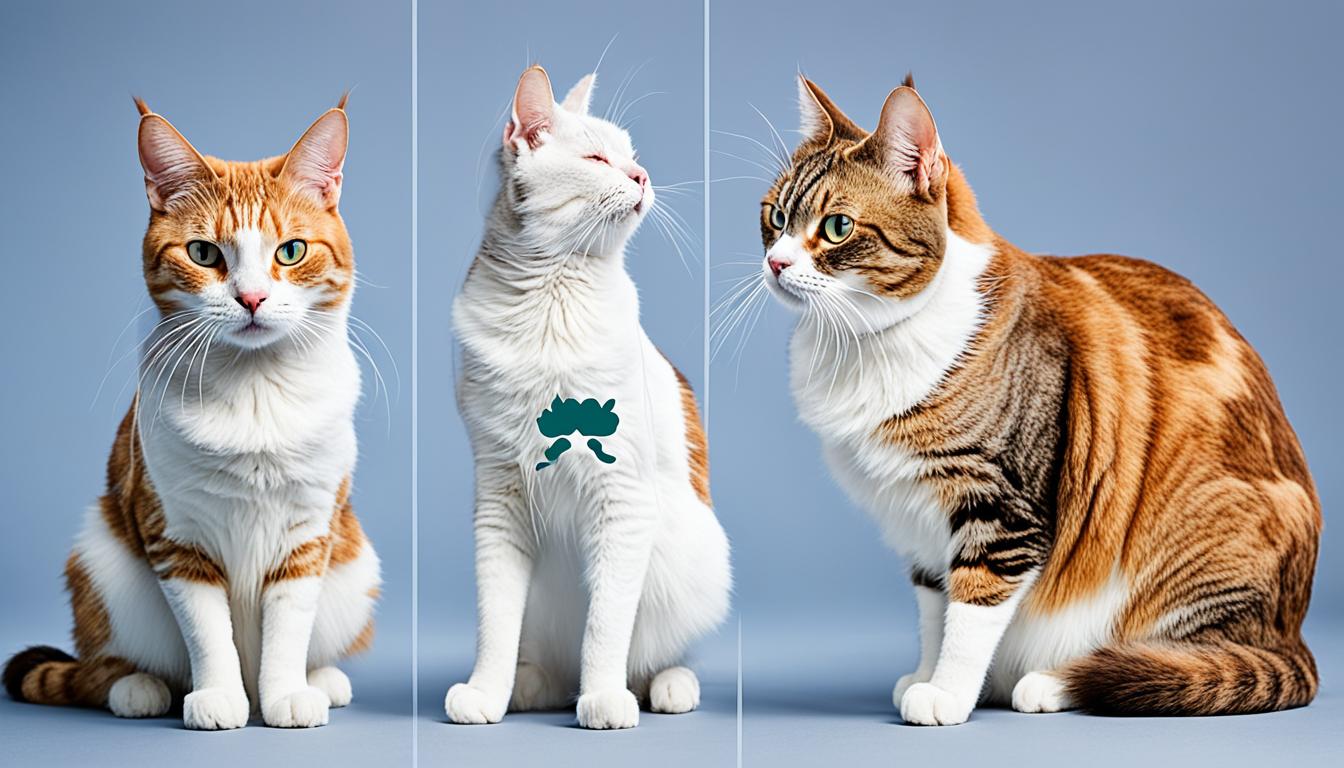Rex cats, like the Cornish Rex and Devon Rex, are known for their special looks and fun nature. But, it’s important for potential owners to know about their health. It’s key to understand the health issues and how to take care of them. This article will cover the health concerns, genetic issues, and how to keep Rex Cats healthy.
Knowing this helps with being a good pet owner and helps keep your cat healthy. It’s all about taking care of your Rex cat’s unique needs.
Key Takeaways
- Rex cats have unique health concerns that should be monitored by owners.
- Regular veterinary check-ups play a crucial role in maintaining feline health.
- A balanced diet is essential for the well-being of Rex breeds.
- Genetic predispositions may affect the health of Rex cats.
- Awareness of common health issues can lead to quicker interventions.
Introduction to Rex Cats
Rex cats are fascinating with their unique traits and lively personalities. Their history shows how they evolved over time. This section looks at the origins of the Cornish Rex and Devon Rex breeds.
History of Rex Breeds
In the mid-20th century, Rex cats appeared, thanks to genetic mutations. The Cornish Rex started in Cornwall, England, in the 1950s. The Devon Rex was found in Devon, England, around the same time. Their curly fur came from genetic changes, making them stand out.
This unique look led to their popularity as beloved pets.
Unique Characteristics of Rex Cats
Rex cats are known for their curly coats, which set them apart. Both the Cornish Rex and Devon Rex have big ears, showing their playful and loving nature. They have slender bodies and long faces, adding to their charm.
They are social and energetic, forming strong bonds with people. This makes them great pets for families and individuals.

Are Rex Cats Healthy? Key Health Concerns
Rex cats are known for their unique look and playful nature. They also face health challenges. It’s important for owners and breeders to know about these issues. This knowledge helps in taking care of Rex cats.
Common Health Issues in Rex Breeds
Rex cats often deal with health problems. Here are some common ones:
- Skin Conditions: Their lack of fur and curly coat can lead to skin issues like dermatitis and infections.
- Obesity: If not watched closely, Rex cats can easily become overweight, which is bad for their health.
- Dental Issues: Rex cats might have more dental problems, including periodontal disease.
Genetic Predispositions
Rex breeds have genetic health issues that can be serious. Some major conditions include:
| Health Condition | Description |
|---|---|
| Hypertrophic Cardiomyopathy (HCM) | This is a heart condition where the heart muscle gets thicker. It can lead to heart failure. |
| Spina Bifida | This is a birth defect of the spine that can make moving hard for some Rex cats. |
| Allergies | Rex cats might be more likely to have allergies, which can make their health harder to manage. |

Preventive Care for Rex Cats
Keeping Rex cats healthy means taking steps early on. Regular vet visits are key to spotting and fixing health issues fast. This helps keep these special cats thriving.
Importance of Regular Veterinary Check-ups
Seeing the vet regularly is a must for cats. Rex cats face certain health risks because of their breed. Regular check-ups help catch problems early, like skin or breathing issues.
Recommended Vaccinations and Treatments
Vaccines are crucial for Rex cats. Keeping them up-to-date protects them from diseases and lowers the risk of outbreaks. You should get them vaccinated for:
- Rabies
- Feline Distemper (FVRCPC)
- Feline Leukemia (FeLV)
- Feline Immunodeficiency Virus (FIV)
Don’t forget about treatments for fleas and ticks too. These pests can harm your Rex cat’s health. A good preventive care plan means your cat will live a happier, healthier life.
Nutritional Considerations for Rex Cats
Nutrition is key for Rex Cats’ health. They need a balanced diet for their active life and health needs. Owners should focus on the right nutrients for their cat’s diet.
Best Diet Practices for Optimal Health
For Rex Cats, high-quality, balanced cat food is crucial. Here are the key dietary components:
- Proteins: Important for muscles and energy, choose real meats like chicken, turkey, or fish.
- Fats: Healthy fats help with skin and coat health. Use fish oil or chicken fat.
- Carbohydrates: Moderate amounts help with digestion. Pick whole grains and veggies.
Food Allergies and Sensitivities
Rex Cats can get food allergies and sensitivities, affecting their health. Knowing the signs of food allergies in cats is key:
- Itchy skin or too much grooming
- Stomach issues like vomiting or diarrhea
- Ear infections or ongoing inflammation
Finding out what allergens cause problems can be hard. A vet might suggest an elimination diet to find the culprits. Watching how your Rex Cat reacts to different foods is crucial for their diet health.
| Nutrient | Importance | Sources |
|---|---|---|
| Protein | Builds and repairs tissues, provides energy | Chicken, Fish, Turkey |
| Fats | Supports skin, coat health, and energy | Fish oil, Chicken fat |
| Carbohydrates | Aids in digestion and energy | Brown rice, Sweet potatoes |
Conclusion
Ensuring the health of Rex Cats means understanding their unique traits and health issues. It’s key to know about common health problems and genetic risks they might face. Being proactive helps prevent health issues from happening.
Good health care for Rex breeds means regular vet visits, keeping up with shots, and watching what they eat. Following best practices in cat care boosts their health and happiness. It’s important to keep an eye on their health and get medical help when needed.
With the right care, Rex cats can bring great joy and happiness. By focusing on their health, you help them live a long and happy life. They become a valued part of your family for many years.

